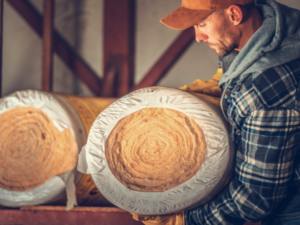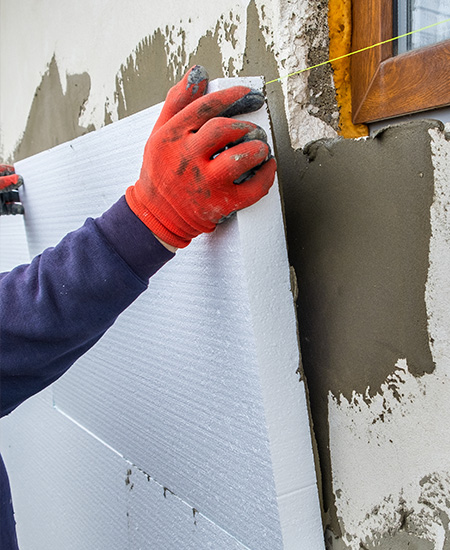
£3500 GOV grants to fight Energy Bills
Act Now: Martin Lewis Urges Low Earners to Apply for £3,500 Insulation Boost Before Winter
External Wall Insulation (EWI) is a system of insulating material applied to the exterior walls of a building to improve its thermal efficiency.
This process involves fixing insulation boards to the outside walls, and then covering them with a protective, decorative render or cladding.
EWI helps to reduce heat loss, lower energy bills, and improve indoor comfort by maintaining a consistent temperature. It also provides additional benefits such as enhancing the building’s appearance, reducing condensation, and protecting the exterior walls from weather damage.
This insulation method is particularly effective for older buildings with solid walls that lack cavity walls for internal insulation.

Insulating external walls significantly reduces heat loss, leading to improved energy efficiency. This means your home stays warmer in winter and cooler in summer, resulting in lower energy consumption and reduced utility bills.
External wall insulation provides an additional layer of protection against the elements. It helps shield your walls from rain, wind, and temperature fluctuations, preventing issues such as damp, mould, and structural damage, thereby extending the lifespan of your home.
Adding external wall insulation can boost the value of your property. Energy-efficient homes are highly attractive to potential buyers, and the improved appearance and reduced energy costs can make your property stand out in the market.
Many older buildings were constructed without cavity walls, making them more prone to heat loss and less energy-efficient. By adding external insulation, these properties can significantly improve their thermal performance, reducing heating costs and enhancing comfort levels for occupants.
External wall insulation acts as a protective barrier for the building envelope. It helps to shield the walls from weather elements such as rain, wind, and temperature fluctuations, which can otherwise cause damage and deterioration over time.
External wall insulation is essential for older properties seeking to improve energy efficiency, address structural issues, and enhance visual appeal, thereby ensuring sustainable and comfortable living environments for years to come.
Determining whether your property has an external solid wall or a cavity wall can usually be done through a few straightforward methods:
1. Age of Property:
Pre-1920 homes were typically built with solid external walls.
2. Exterior Appearance
If the external walls appear uniform and without visible gaps or patterns in the brickwork, it is likely to be a solid wall.
3. Drilling Inspection
If unsure, a professional can drill a small hole in an inconspicuous area of the external wall to inspect its construction.
4. Professional Survey
For accurate assessment and advice tailored to your property, consider hiring a professional surveyor or insulation specialist.
Contact Eco Systems today at 0203 411 4885 for expert guidance in selecting the ideal external wall insulation solution for your needs.
Benefit from stress-free installation and exceptional aftercare services, ensuring top-quality results and optimal energy efficiency.
Fill out our contact form to embark on your energy-saving journey with confidence.
External wall insulation involves adding a layer of insulating material to the exterior walls of a building. This improves thermal efficiency, reduces heat loss, and enhances the building’s overall energy performance.
Benefits include enhanced comfort, lower energy bills, increased property value, additional living space, improved energy efficiency, and reduced carbon footprint.
Benefits include improved energy efficiency, reduced heating costs, enhanced thermal comfort, protection of the building structure from weather elements, and potential increases in property value and aesthetic appeal.
Most properties with solid walls or those with insufficient cavity walls can benefit from external wall insulation. It’s essential to assess factors such as wall condition, planning regulations, and the availability of suitable installation methods.
Installation involves fixing insulation boards to the exterior walls, followed by applying a protective render or cladding. The process may also include preparatory steps like surface cleaning, fixing anchors, and ensuring proper ventilation.
EWI offers a variety of finishes and colors, allowing you to enhance the aesthetic appeal of your property. It can modernize the exterior while also providing functional benefits such as weatherproofing and improved insulation.
The UK government have many insulation funding schemes which may mean that you can get a fully funded or partially funded insulation service for your external wall. Contact us about external wall insulation funding to find out more.

Act Now: Martin Lewis Urges Low Earners to Apply for £3,500 Insulation Boost Before Winter

Our mission is to provide you with top-tier eco-friendly insulation and energy-saving solutions tailored to your needs.